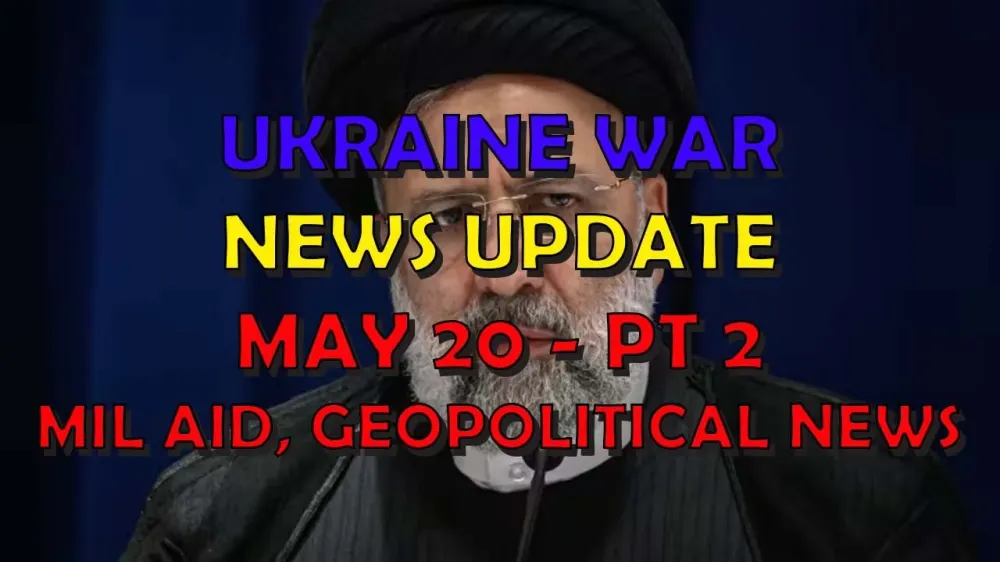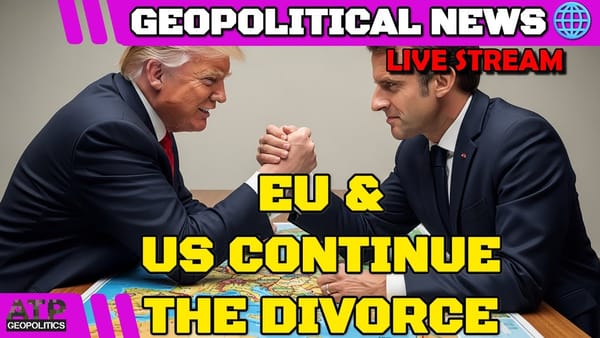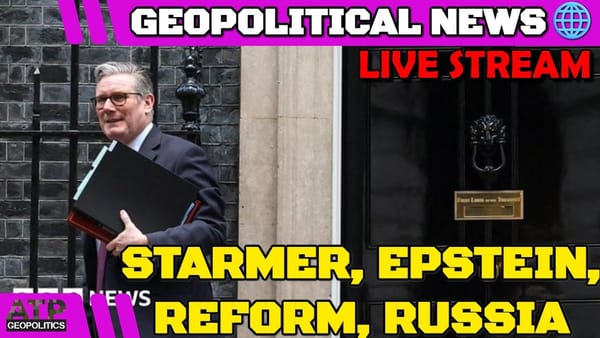Ukraine War Update NEWS: Military Aid & Geopolitics News
Table of Contents 📖
"Let's not pussyfoot around anymore."
Hello Team
🎦 00:00-00:17⏩
Jonathan welcomes viewers to another ATP Geopolitics video, a Ukraine War News Update for 20th May 2024. This is the second part of the day's updates, combining military aid and geopolitical news.
Return to top⤴️
G7 to debate €30bn loan to Ukraine
🎦 00:17-00:53⏩
G7 finance ministers are set to discuss a €30 billion loan for Ukraine, potentially using frozen Russian assets as collateral. Jonathan views this as a positive solution. UK Defence Secretary Grant Shapps announced the delivery of 1 million rounds of ammunition, air defence missiles, and drones to Ukraine.
Return to top⤴️
UK sends military aid to Ukraine
🎦 00:53-01:47⏩
The UK has sent 1 million rounds of ammunition, 100 missiles, 20 Viking armoured amphibious vehicles, over 4,000 pieces of military clothing, and anti-mine equipment to Ukraine. Jonathan speculates that the missiles are likely to be short-range, such as Brimstone or Starstreak, rather than Patriots.
Return to top⤴️
Scholz urged to send long-range missiles to Ukraine
🎦 01:47-02:16⏩
The UK Defence Secretary has urged Germany to provide Ukraine with long-range missiles and allow strikes on Russian-occupied Crimea. This follows the UK's decision to provide Storm Shadow cruise missiles.
Return to top⤴️
Analysis of the attack on the Russian ship in Sevastopol
🎦 02:16-03:47⏩
Jonathan analyses the sinking of a Russian ship in Sevastopol, suggesting it might have been the first Ukrainian use of the 300km-range M48 or M57 Unitary A-TACMs missile, citing a Forbes article by David Axe. He expresses scepticism over Russian claims of intercepting nine out of 12 A-TACMs, deeming their purported 50% interception rate for such missiles as highly unlikely.
Return to top⤴️
French Parliament debate allowing Ukraine to strike Russia with French weapons
🎦 03:47-05:45⏩
The French Parliament is debating whether to permit Ukraine to strike Russian territory using French weapons. Jonathan discusses Macron's stance, which appears open to the idea, though not explicitly stated. The Chairman of the Foreign Affairs Committee in France advocates for strategic symmetry, urging France to follow the UK's example in allowing such strikes. However, Jonathan notes that Ukraine hasn't used UK-supplied Storm Shadow missiles to strike inside Russia. He posits several reasons for this, including:
- Targets within range in Russia might not be as high-value.
- Potential pressure from the US against escalation.
- Ukrainian concerns about escalatory outcomes.
- A strategic decision to reserve Storm Shadows for a significant target within Russia.
NATO allies training Ukrainian soldiers in Ukraine
🎦 06:41-07:42⏩
Estonian Prime Minister Kaja Kallas has stated that training Ukrainian soldiers within Ukraine by NATO allies doesn't escalate the war or risk direct conflict with Russia. Reports from the Financial Times suggest that this training is already happening on a bilateral basis, with troops from NATO nations present in Ukraine but not operating under the NATO umbrella. Kallas argued that such decisions don't automatically draw NATO into a war with Russia. Jonathan welcomes this perspective and reiterates the need for normalising this type of support.
Return to top⤴️
Jake Bro raises $1.14 million for Ukraine
🎦 08:14-09:48⏩
Jonathan highlights the remarkable fundraising efforts of Jake Bro, whose YouTube community raised over $1.14 million for Ukraine in just seven days. The funds will be used to purchase 30 pickup trucks and numerous drones for the Ukrainian military. Jonathan commends Jake Bro for using his platform effectively and draws a contrast with the lack of similar international fundraising efforts for Russia's war effort. He sees this as a testament to the perceived morality of both sides in the conflict. Jonathan also mentions that his own channel has raised over £260,000 for medical vehicles for Ukraine.
Return to top⤴️
Iran's President dies in Helicopter Crash
🎦 09:48-14:03⏩
A helicopter carrying Iranian President Ebrahim Raisi, the Foreign Minister, and other officials crashed in Iran. While condolences pour in, many Iranians, particularly women, are celebrating his demise. Jonathan points out Raisi's grim legacy, including his role in the mass execution of political prisoners in 1988. He ponders the future trajectory of Iran and whether a new leadership might shift its allegiance away from the Russia-China axis. He suggests watching his interview with an Iranian friend on his Atypical Philosopher channel for further insights.
Return to top⤴️
Putin puts Russia on permanent war footing
🎦 14:03-17:01⏩
Jonathan cites a Times article reporting that Putin has placed Russia on a permanent war footing, signifying a deeper shift than a temporary mobilization. He highlights analysis by Russia expert Mark Galeotti, who sees this as a move towards a permanently mobilized state engaged in perpetual warfare. Putin has reshuffled his government, integrating the defence and civilian economies to support this goal. Jonathan notes the replacement of Defence Minister Sergei Shoigu with Andrei Belousov, an economist tasked with preparing the country for a long war. Belousov's priorities include aligning the economy with war needs and fostering innovation within the Ministry of Defence. Galeotti believes this reshuffle is an attempt to address the disconnect between Russia's top leadership and the realities on the ground, as evidenced by recent arrests within the military, including former Chief of the General Staff, Lieutenant General Yuri Kuznetsov, on corruption charges. Jonathan agrees with Galeotti's assessment that this signals Putin's expectation of a protracted war of attrition. He points out the advantages for the Russian authorities in maintaining a state of constant war, including tighter control over the economy, increased opportunities for corruption, justification for suppressing dissent, and an excuse for failing to deliver on economic and social promises. Jonathan concludes that this militarization extends beyond Ukraine, reflecting Putin's perception of an ongoing economic, political, cultural, and social war with the West.
Return to top⤴️
Russia's use of civilians for spying and sabotage
🎦 17:01-19:03⏩
Jonathan discusses a Wall Street Journal article exposing Russia's use of civilians and commercial vessels for sabotage and espionage in Europe. He expresses frustration that governments are hesitant to publicize these activities for fear of escalating tensions and causing public alarm. Jonathan believes that acknowledging these actions openly would be more honest and realistic, given that many Western nations are already engaged in a proxy war with Russia by supporting Ukraine. He advocates for greater transparency about Russia's actions and the West's involvement in the conflict.
Return to top⤴️
EU considers sanctions on institutions aiding Russia's Military
🎦 19:03-20:46⏩
France and the Netherlands are proposing EU sanctions targeting any financial institution globally that assists Russia's military in acquiring goods or technologies for weapons production. Jonathan applauds this measure, believing it is a necessary step. The proposal, if enacted, would prohibit EU entities from conducting business with any financial institution identified as aiding Russia's military. This ban could deter institutions in the Middle East, Turkey, or even China from engaging in such deals to avoid losing access to the EU market. Jonathan draws a parallel to US secondary sanctions and predicts that Switzerland, as a major financial hub, would likely adopt similar measures. He reiterates his stance that the West should take a more assertive approach towards Russia, pushing for its capitulation and a reset.
Return to top⤴️
Austrian Businessman provides aid to Russian-occupied Luhansk
🎦 20:49-21:34⏩
Jonathan reports on Otto Hirsch, an Austrian construction company owner, who is providing material aid to Russian-occupied Luhansk, a move welcomed by Russian diplomats and propagandists. Jonathan invites his Austrian viewers to provide further information about Hirsch's background and motives.
Return to top⤴️
Finland to block migrants entering from Russia
🎦 21:34-23:14⏩
Finland is planning to amend its laws to prevent migrants from entering from Russia, potentially breaching international commitments. Jonathan acknowledges claims, disputed by some, that Russia and Belarus have been deliberately channelling migrants from Africa and Asia into the EU to destabilise the bloc, citing similar concerns voiced by Finland, the Baltic states, and Poland. He questions whether this move by Finland is a genuine attempt to address this issue or a cynical ploy to justify stricter migration policies using Russia as a pretext.
Return to top⤴️
US considers sanctions against Georgian officials over "foreign agent" law
🎦 23:14-24:21⏩
Jonathan reports that US Congress is considering asset freezes and travel bans against Georgian officials involved in advancing a Russian-style "foreign agents" law. This bill aims to hold accountable those responsible for pushing this controversial legislation. Although Georgian President Salome Zourabichvili vetoed the law, the ruling Georgian Dream party intends to overturn her veto. Jonathan expresses disappointment, noting that Georgia appears to be aligning itself with Russia in this instance. He speculates about the potential impact on upcoming elections in Georgia.
Return to top⤴️
Russia facing labour shortage
🎦 24:21-26:34⏩
Citing British intelligence, Jonathan reports a significant labour shortage in Russia, impacting key sectors. Independent Russian media estimates a deficit of 4.8 million workers in 2023. He attributes this shortage to the war in Ukraine, which has resulted in mobilization, emigration of skilled workers, and restrictions on migrant labour following an ISIS-K terrorist incident in Moscow. To address this, Russian parliamentarians are exploring amendments to the labour code that would allow the state to relocate surplus labour to areas with shortages, albeit with worker consent. Jonathan sees this as a potential step towards labour mobilization, indicating the desperate state of the Russian economy and a shift towards centralized planning.
Return to top⤴️
Strained Relations between China and Russia?
🎦 26:34-32:52⏩
Jonathan discusses the complex relationship between Russia and China, noting that state-controlled newspapers in Russia are expressing doubts about the partnership, a move he believes has Kremlin approval. He cites a report by BBC's Steve Rosenberg, who highlights the cautious language used in Russian media regarding the "strategic partnership" between the two countries, despite Putin's recent visit to China. Jonathan observes that while public opinion in China is generally pro-Russian, there's growing concern within Russia about becoming overly reliant on China. Specific points of contention include:
- China's preference for controlling the transport infrastructure projects it invests in, something Russia is reluctant to concede.
- Chinese banks halting settlements with Russia due to fear of secondary sanctions.
- Concerns that Russia's dependence on the Chinese economy will increase if it fails to revitalize its own industries.
- Russian unease over the gap between China's rhetoric of "no-limits friendship" and its pragmatic actions.
Jonathan believes that Russia is intentionally signalling its awareness of these issues to China through its media, highlighting the tensions in their relationship. He sees this as a positive development for Ukraine and the West, as it exposes the limits of the Russia-China partnership.
Return to top⤴️
Wrap up
🎦 32:52-32:56⏩
Jonathan thanks viewers for watching and encourages them to like, subscribe, and share the video.
Return to top⤴️




